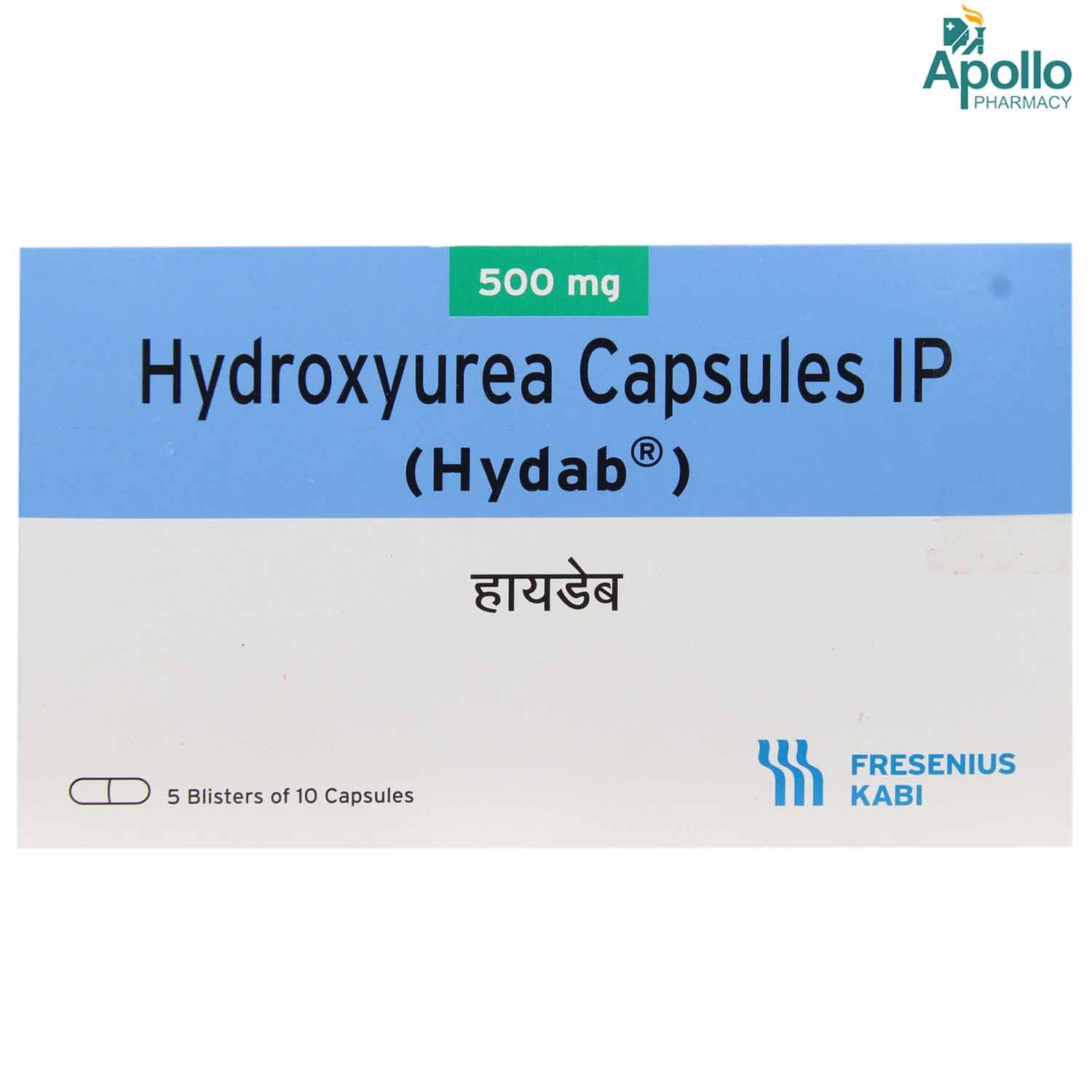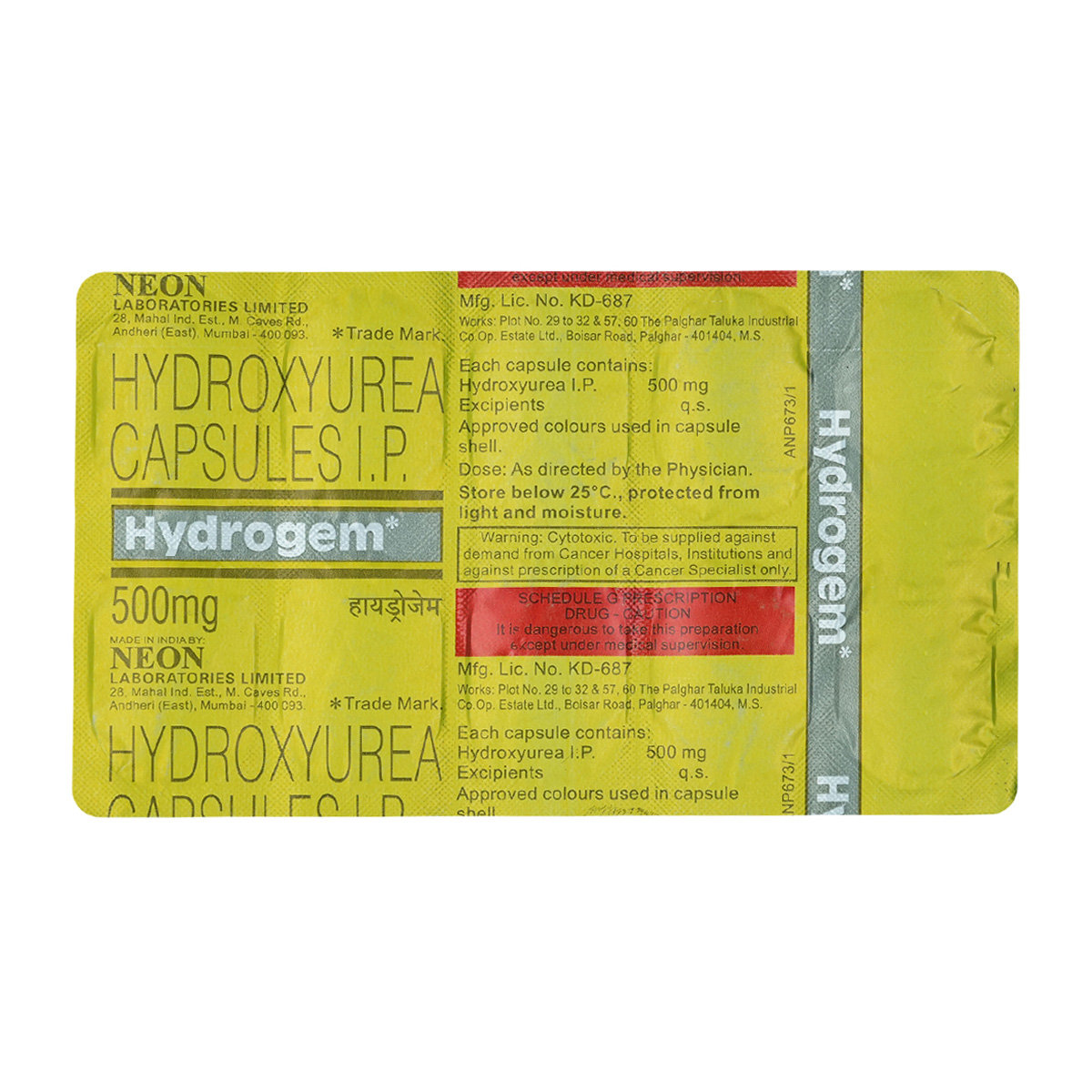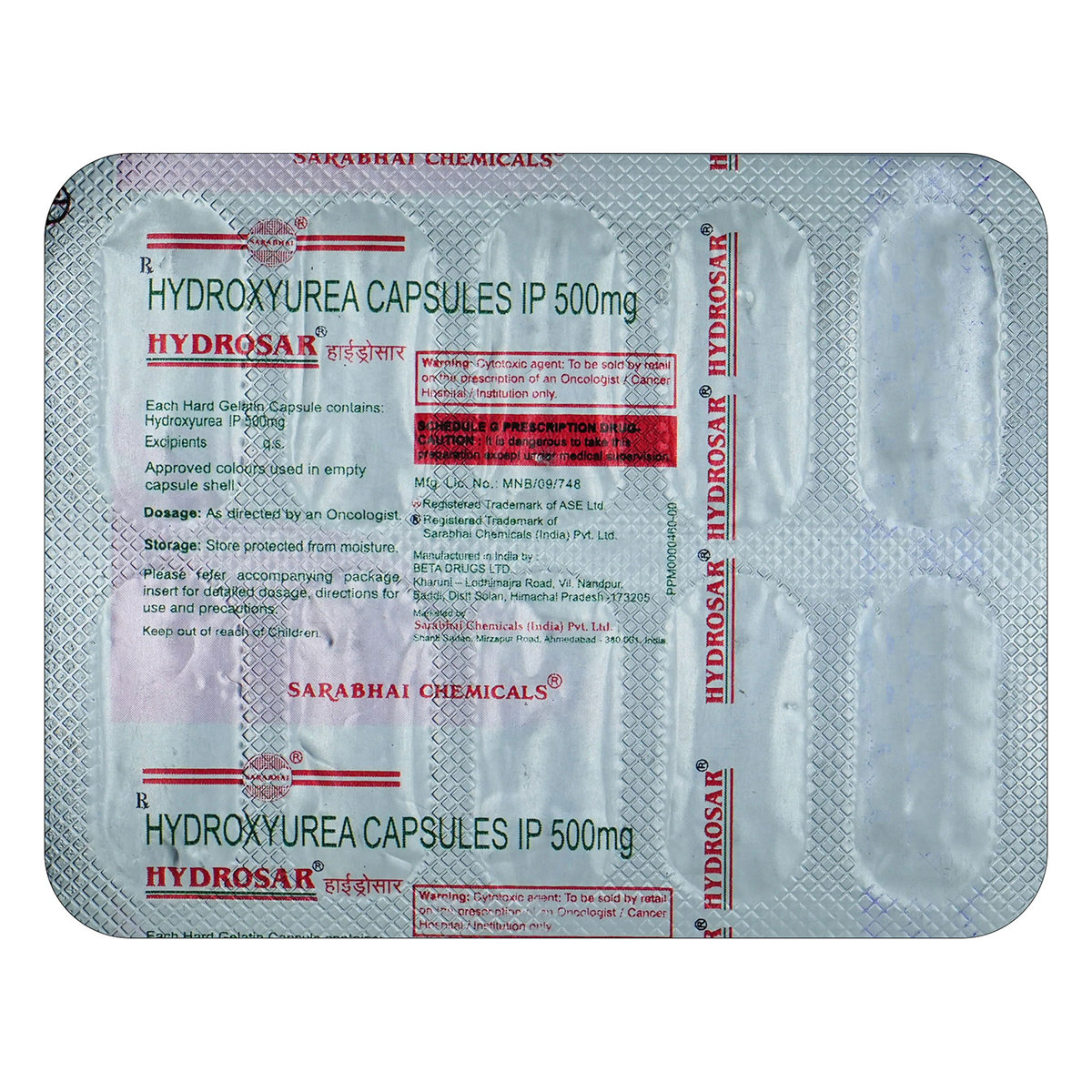Hydroxyurea
About Hydroxyurea
Hydroxyurea belongs to a group of classes known as an antimetabolite. It is an anticancer medicine used to treat head and neck cancer and sickle cell anemia (blocking the flow of blood that causes pain and organ damage). Head and neck cancer is a disease including abnormal growth of the tissues of the neck and head that may also have the ability to attack or spread to other portions of the body. Sickle cell anemia is a disease in which your body results in abnormally shaped red blood cells. The cells are shaped like a curved or sickle.
In cancer, Hydroxyurea works by blocking an enzyme that is required for growing cells. This prevents the cancer cells from multiplying and growing. In sickle cell disease, it works by increasing fetal hemoglobin (HbF) (hemoglobin of unborn baby) levels in red blood cells (RBCs). This helps the RBCs accept a normal shape, recovers the flow of blood, and protects against problems like painful sickle cell attacks.
Take Hydroxyurea as prescribed by your doctor. You are advised to take Hydroxyurea for as long as your doctor has prescribed it for you depending on your medical conditions. You may experience loss of appetite (feeling unwell and stomach upset), Increased bleeding tendency, nausea, upset stomach, vomiting. Most of these side effects of Hydroxyurea do not require medical attention and gradually resolve over time. However, if the side effects are persistent, reach out to your doctor.
Before starting Hydroxyurea, please inform your doctor if you have any allergy, kidney disease, liver disease, injury on your legs, HIV or AIDS, high level of uric acid in your blood, and treatment with chemotherapy or radiation. Hydroxyurea may increase the chances of other cancer. Inform your doctor about this risk. Immediately contact your doctor if you are pregnant because this Hydroxyurea can cause harmful effects on the unborn baby. Both women and men using this Hydroxyurea should use birth control to avoid pregnancy. The use of this Hydroxyurea by either parent may results in birth defects. You should not take this Hydroxyurea during breastfeeding, inform your doctor if you take Hydroxyurea.
Uses of Hydroxyurea
Medicinal Benefits
Hydroxyurea belongs to a group of the class known as an antimetabolite. It is used to treat head and neck cancer and sickle cell anemia (blocking the flow of blood that causes pain and organ damage). In cancer, Hydroxyurea works by blocking an enzyme that is required for growing cells. This prevents the cancer cells from multiplying and growing. In sickle cell disease, it works by increasing fetal hemoglobin (HbF) (hemoglobin of unborn baby) levels in red blood cells (RBCs). This helps the RBCs accept a normal shape, recovers the flow of blood, and protects against problems like painful sickle cell attacks.
Directions for Use
Storage
Side Effects of Hydroxyurea
- Loss of appetite (feeling unwell and stomach upset)
- Increased bleeding tendency
- Nausea
- Upset stomach
- Vomiting
Drug Warnings
Before taking Hydroxyurea inform your doctor if you have any kind of infection because Hydroxyurea may worsen the infections. Talk to your doctor if you have any allergy symptoms. Kidney disease, liver disease, injury on your legs, HIV or AIDS, high level of uric acid in your blood, and treatment with chemotherapy or radiation inform your doctor. Hydroxyurea may increase the chances of other cancer. Inform your doctor about this risk. Immediately contact your doctor if you are pregnant because this Hydroxyurea can cause harmful effects on the unborn baby. Both women and men using this Hydroxyurea should use birth control to avoid pregnancy. The use of this Hydroxyurea by either parent may result in birth defects. You should not take this Hydroxyurea during breastfeeding, inform your doctor if you take Hydroxyurea. If any powder from a damaged pill is leaked, wash it up at once with a wet paper towel and throw the towel away in a closed plastic bag where children cannot get to it.
Drug Interactions
Drug-Drug Interaction: Hydroxyurea may interact with antiviral medicines (didanosine, stavudine, and indinavir), pain killer (aspirin, ibuprofen), blood thinner (warfarin), antiallergic medicines (diphenhydramine), antigout medicine (allopurinol), medicine for sleep (zolpidem).
Drug-Food Interaction: No interactions found.
Drug-Disease Interaction: People affected with kidney disease, liver disease, reduce production of blood cells, and brain disorder.
Drug-Drug Interactions Checker List:
Safety Advice

Alcohol
cautionThe drinking of alcohol (in small amounts) does not appear to affect the safety or usefulness of Hydroxyurea. If taking alcohol more amount then it causes dizziness.

Pregnancy
unsafeHydroxyurea is not safe during pregnancy because it may cause harmful effects to the baby.

Breast Feeding
cautionIt is unknown whether Hydroxyurea is excreted in human milk. Please consult a doctor before using Hydroxyurea while breastfeeding.

Driving
cautionHydroxyurea may cause dizziness or severe headache. Therefore, drive only if you alert after taking Hydroxyurea.

Liver
cautionIf you have any concerns regarding the use of Hydroxyurea in patients with liver problems, please consult a doctor.

Kidney
cautionIf you have any concerns regarding the use of Hydroxyurea in patients with kidney problems, please consult a doctor.

Children
unsafeSafety and efficacy of Hydroxyurea have not established for children. Therefore not recommended for children.
Habit Forming
Diet & Lifestyle Advise
- Take Hydroxyurea at the same time daily, either with or without a meal.
- It is recommended to remain hydrated and drink a lot of fluids while taking Hydroxyurea.
- Do not miss any dose and finish the course as recommended by your doctor.
- Use an efficient method of birth control to prevent pregnancy while taking this Hydroxyurea.
- Your doctor may get routine blood tests done to monitor your liver function, electrolyte levels, blood cell count in your blood.
Special Advise
- Wash your hands before and after handling the bottle containing Hydroxyurea.
- Crushed or broken pill can be unsafe if it gets in your mouth, nose, eyes, or on your skin. If this happens, wash your skin with water and soap or wash your eyes with water.
Patients Concern
Disease/Condition Glossary
Head and neck cancer: It is a disease including abnormal growth of the tissues of the neck and head that may also have the ability to attack or spread to other portions of the body. Cancer of the head and neck generally starts in the cells known as squamous cells which appear in the lining of the surface of moist mucosa in the head and neck (e.g., inside of the throat, nose, and mouth).
Sickle cell anemia: It is a disease in which your body results in abnormally shaped red blood cells. The cells are shaped like a curved or sickle. They do not last as long as round, normal, red blood cells. This causes anemia. The sickle cells also get pushed into blood vessels, blocking the flow of blood. This can result in pain and organ damage.
FAQs
Take the Hydroxyurea as soon as you can but avoid the missed dose if it is nearly time for your next dose. Do not take two doses at one time. Get your prescription refilled before you run out of Hydroxyurea entirely.
Immediately go to the emergency department of your nearest hospital. Be ready to tell or show what was taken, how much, and when it happened.
Hydroxyurea may cause a risk of skin cancer. Avoid contact with sunlight or tanning beds. Wear protective cloth and use sunscreen (SPF 30 or higher) when you are outside. Do not handle Hydroxyurea without the protection of skin.
Hydroxyurea can cause dizziness and drowsiness during the first limited hours after you take it. These side effects are more expected to happen when you start taking Hydroxyurea or when your doctor increases your dose.
Do not stop taking Hydroxyurea without discussing it with your doctor. Your doctor will most likely tell you to take another medicine, folic acid (a vitamin), to reduce some of the side effects of this Hydroxyurea. Take this Hydroxyurea exactly as instructed.






